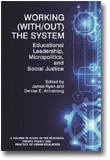
Working (With/out) the System
Educational Leadership, Micropolitics and Social Justice
Edited by:
James Ryan, Ontario Institute for Studies in Education
Denise E. Armstrong, Brock University
A volume in the series: Issues in the Research, Theory, Policy, and Practice of Urban Education. Editor(s): Denise E. Armstrong, Brock University. William S. Ankomah, St. Francis Xavier University, Canada.
Published 2016
This edited collection of chapters from invited scholars, explores issues of social justice and micropolitics in educational institutions. More specifically, it examines the ways in which social justice workers navigate, or can navigate, (micro) political systems in their quest to promote social justice. Issues of social justice and micropolitics are particularly important in this day and age as standardizing regimes and polarizing forces continue to erode the already perilous condition of the traditionally disadvantaged. While social justice workers make it a point to acknowledge the plight of the less fortunate, their well-meaning attempts to take action are not always successful. This requires that they acknowledge the realities of the micropolitical environments in which they work, and to take action in these arenas if they are to achieve their social justice goals.
The title of the book, Working (With/out) the System, draws attention to the ways in which social justice workers/leaders (teachers, administrators, students, community members) navigate educational institutions and the wider social systems that are not always hospitable to changes that promote social justice. This volume describes the prospects, possibilities and actual practice of working with, working without, and working outside of educational organizations to promote social justice. Among other topics, the chapters probe:
- the manner in which social justice-minded leaders navigate micropolitical environments
- the ways in which social justice minded leaders promote and sustain social justice action within systemic contexts
- the difficulties and successes that they experience.
CONTENTS
Series Editors’ Preface, Brenda J. McMahon and Denise E. Armstrong. Acknowledgments. Introduction: Micropolitical Leadership for Social Justice: Working (With/out) the System, James Ryan and Denise E. Armstrong. A Micropolitics for Social Justice Activism, James Ryan and Katie Higginbottom. Principals Mediating Neoliberal Policies: Micropolitics, Discourse, and Social Justice, Sergio Saldivia and Gary Anderson. The Ethics of (Micro) Political Tactics and Doing Social Justice Work, Stephanie Tuters and Denise Armstrong. Public School Principals’ Reasoning and Reflection-in-Action, William Greenfield Jr. and Joseph Hunter. “Doing” Social Justice Leadership: Connecting the Macro and Micro Contexts of Schooling, Pamela Angelle, Michele Morrison, and Howard Stevenson. Fear Factors and Micropolitics: The Struggles and Costs of Social Justice Leadership, Shemina Sheikh. Authentic Leadership in the Context of Social Justice and Organizational Politics, Anthony Normore, Nancy Erbe and Swaranjit Singh. Insider-Outsider Empowered Deliberative Action: Toward a Model of Youth Empowerment and Educational Justice, Celina Su. The Micropolitics of Management in Universities: Challenges and Opportunities, Lisa Ehrich, Megan Kimber, and John Ehrich. (Re-)Working the System from Within Through Faculty Governance, Dilys Schoorman. Navigating the Rapids: Leading for Social Justice in Higher Education, Carolyn Shields. The Politics of “Cage-Busting” Leadership, Joseph Flessa. About the Authors.
-
Paperback9781681232249
Web price: $45.04 (Reg. 52.99)
-
Hardcover9781681232256
Web price: $80.74 (Reg. 94.99)
- eBook9781681232263

- EDU054000 - EDUCATION: Urban
- EDU032000 - EDUCATION: Leadership
- EDU001000 - EDUCATION: ADMINISTRATION: General
-
 Convictions of Conscience
How Voices From the Margins Inform Public Actions and Educational Leadership
Convictions of Conscience
How Voices From the Margins Inform Public Actions and Educational Leadership
-
 Including Families and Communities in Urban Education
Including Families and Communities in Urban Education
-
 Leadership from the Ground Up
Effective Schooling in Traditionally Low Performing Schools
Leadership from the Ground Up
Effective Schooling in Traditionally Low Performing Schools
-
 Schools as Radical Sanctuaries
Decolonizing Urban Education through the Eyes of Youth of Color
Schools as Radical Sanctuaries
Decolonizing Urban Education through the Eyes of Youth of Color
-
 Struggling for Inclusion
Educational Leadership in a Neo-Liberal World
Struggling for Inclusion
Educational Leadership in a Neo-Liberal World
-
 Student Engagement in Urban Schools
Beyond Neoliberal Discourses
Student Engagement in Urban Schools
Beyond Neoliberal Discourses
-
 Teach & Thrive
Wisdom from an Urban Teacher's Career Narrative
Teach & Thrive
Wisdom from an Urban Teacher's Career Narrative

